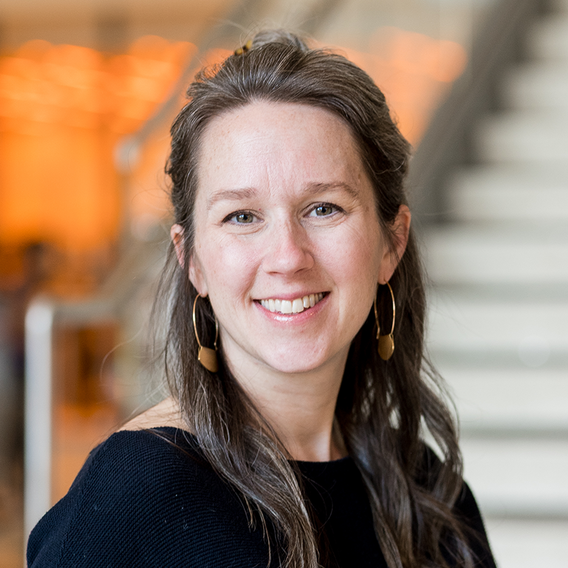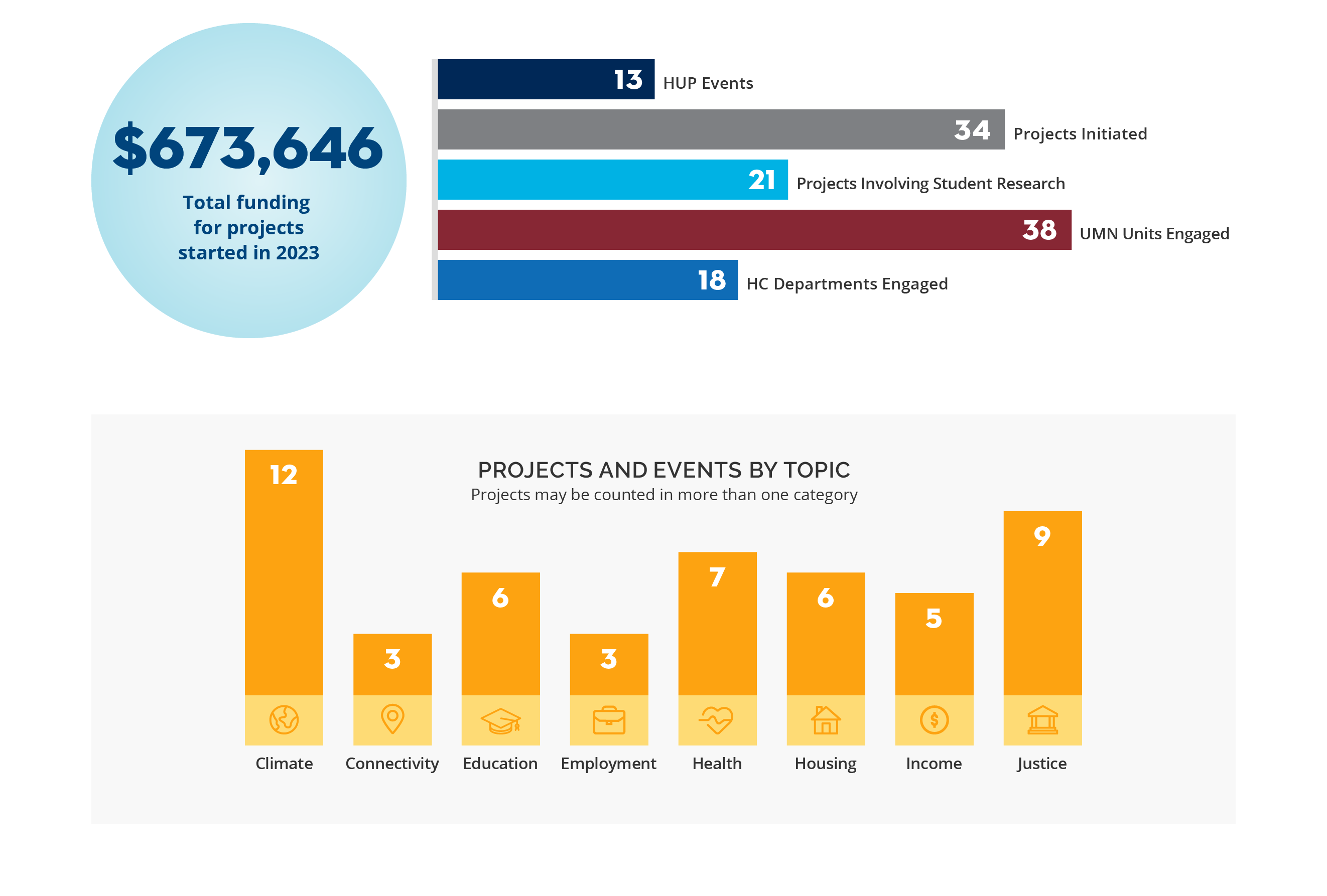Message from the Hennepin-University Partnership Director
Message from the Hennepin-University Partnership Director

This past year has been marked by significant milestones and growth for the Hennepin-University Partnership (HUP), as we continued our mission of catalyzing and supporting mutually beneficial partnerships to drive positive community change. It was also a year of transition as we said goodbye to former director Scott Vargo and HUP Leadership Team member Interim Vice Provost for Public Engagement Heidi Barajas.
In 2023, HUP facilitated 34 projects, 13 events, and involved students on over 21 projects. We convened leaders and subject matter experts from both the county and the university around housing and climate resilience, engaging over 65 faculty, researchers, staff, and administration. We held the second cohort of our Collaborative Research Assistantship and the first cohort of the Evaluation Assistantship, providing nine graduate students with paid research assistantships to work on county-identified research questions. We instituted the “HUP Project Experience,” a robust project and relationship management workflow in support of our project teams. These various threads encapsulate hundreds of hours, connection points, and conversations working in partnership to leverage innovative research to advance meaningful change.
As we reflect on the accomplishments of the past year, I want to extend my deepest gratitude to our partners for your hard work and collaboration. I am excited about the opportunities that lie ahead and I look forward to advancing this critical work together.
In partnership,
Amy Delahanty, HUP Director
Connect with HUP
January - Transportation and Happiness
Priority Area: Connectivity
Dr. Yingling Fan of the Humphrey School of Public Affairs presented “Happy Cities: the Role of Transportation,” exploring how transportation options and choices can affect our emotions and quality of life.
February - Uncovering the Whiteness Pandemic
Priority Area: Justice
Dr. Gail Ferguson presented findings from her Whiteness Pandemic Project, which examines how White parents communicated with their children about racism or antiracism immediately after the murder of George Floyd and one year later.
March - Child care subsidies impact parents’ employment
Priority Area: Income
Dr. Elizabeth E. Davis presented on programs and policies related to low-income families with children, with an emphasis on the impact of child care subsidies on parents’ employment and child care choices.
April - Workshop on a participatory method for evaluation
Dr. Scott Chazdon, University of Minnesota Extension Evaluation and Research Specialist, conducted a free workshop introducing Hennepin County staff to Ripple Effect Mapping, a participatory method for conducting evaluation that engages program and community stakeholders to visually map the chain of effects resulting from a program or collaboration.
May - Humphrey School Capstone Presentations
Priority Area: Housing, Health, Justice, Connectivity
Three teams of graduate students at the Humphrey School of Public Affairs presented findings from capstone projects in partnership with Hennepin County. These teams explored investment in ending single adult homelessness, how cities address gun violence, and pedestrian safety on Hennepin County roadways.
June - Gender disparities in STEM employment persist
Priority Area: Employment
Dr. Tom Van Heuvelen presented his research into gender inequality in science, technology, engineering, and math (STEM) professions, revealing persistent gaps in earnings and employment between men and women that cannot be explained by education or parenthood alone.
July - Changing landlord strategies during and after the eviction moratorium
Priority Area: Housing
Dr. Edward Goetz discussed research into the effect of Minnesota’s eviction moratorium on reported formal and informal evictions in the state. While formal evictions declined during the moratorium, after the moratorium, such reports increased at a greater rate for BIPOC tenants than for white tenants. Informal evictions, or those in which a tenant is made to leave but not through legal means, remained consistent before, during, and after the eviction moratorium.
August - HUP Collaborative Research Assistantship (HCRA) Research Symposium
The seven students in the 2023 HCRA cohort presented the results of their research projects with Hennepin County, shared their learnings, and answered audience questions. Project topics covered a range of issues, including violence prevention, climate resilience, and results-focused investment.
September - Social determinants of mental health in the Twin Cities
Priority Area: Health
Dr. Angie Fertig presented on the associations between social determinants of health (SDOH) and mental health using evidence from a Twin Cities sample, revealing significant variation in access to key SDOH and mental health outcomes by race and ethnicity.
October - Housing discrimination helped shape Minneapolis’ park system
Priority Area: Housing, Justice
Dr. Hannah Ramer and Dr. Rebecca Walker examined key moments over the last century that contributed to the starkly uneven environmental landscape Minneapolis residents experience today.
November - The nature of work is changing, and research says that is a good thing
Priority Area: Employment
Dr. Phyllis Moen and Dr. Sarah Flood discussed their research on the changing nature of work, including the uneven impacts on work attachments, flexible work arrangements and well-being by gender, race, class, and life stage.
Research by UMN Faculty
Supporting a Response to the Benefits Cliff
Priority Area: Income
The benefits cliff occurs when employer-paid wages exceed income limits for public assistance programs like Child Care Assistance or SNAP, deterring long-term career advancement due to immediate loss of support. Hennepin County’s Benefits Cliff Pilot Evaluation supports 13 nonprofits, implementing programs addressing the cliff through financial education, employment training, direct financial aid, and community awareness. Professor Ceema Samimi assesses these programs using descriptive and explanatory analyses, combining quantitative surveys with qualitative methods like focus groups and interviews to inform future Hennepin County actions addressing the benefits cliff.
Innovation in Traffic Signals Reduces Vehicle Idling
Priority Area: Connectivity, Climate
Dr. Michael Levin, in collaboration with Hennepin County Transportation Operations, conducted a study on the max-pressure signal control concept, funded by the Minnesota Local Road Research Board of MnDOT and the National Science Foundation. This innovative traffic signal approach optimizes traffic flow at signalized intersections based on vehicle queues. Utilizing sensors to count waiting and passing vehicles, a Markov chain analysis informs a max-pressure algorithm, significantly reducing lane delays compared to fixed-time signal control. Currently, Dr. Raphael Stern and Hennepin County Transportation Operations are testing the proof-of-concept to integrate max-pressure control hardware with the county’s traffic control system and advanced traffic management software. This research aims to enhance traffic flow. According to the U.S. Environmental Protection Agency, personal-vehicle idling generates around 30 million tons of CO2 annually in the United States. An adaptive signal control strategy is one of many Hennepin County initiatives aimed at preventing idling and reducing greenhouse gas emissions from transportation.
Addressing Youth Mental Health with School-Based Services
Priority Area: Health
Dr. Ezra Golberstein of the University of Minnesota School of Public Health, Irina Zainullina of the Department of Applied Economics, Aaron Sojourner of the W.E. Upjohn Institute for Employment Research, and Mark A. Sander of Hennepin County recently published research in the Journal of Human Resources exploring the impacts of school-based mental health programs in 263 K-12 schools in Hennepin County between 2001 and 2019. This study found that school-based mental health services reduced self-reported rates of attempted suicide by 15 percent, or preventing about 260 suicide attempts by Hennepin County adolescents each year, and also reduced disciplinary behavior and juvenile justice involvement among those who received school-based mental health services.







